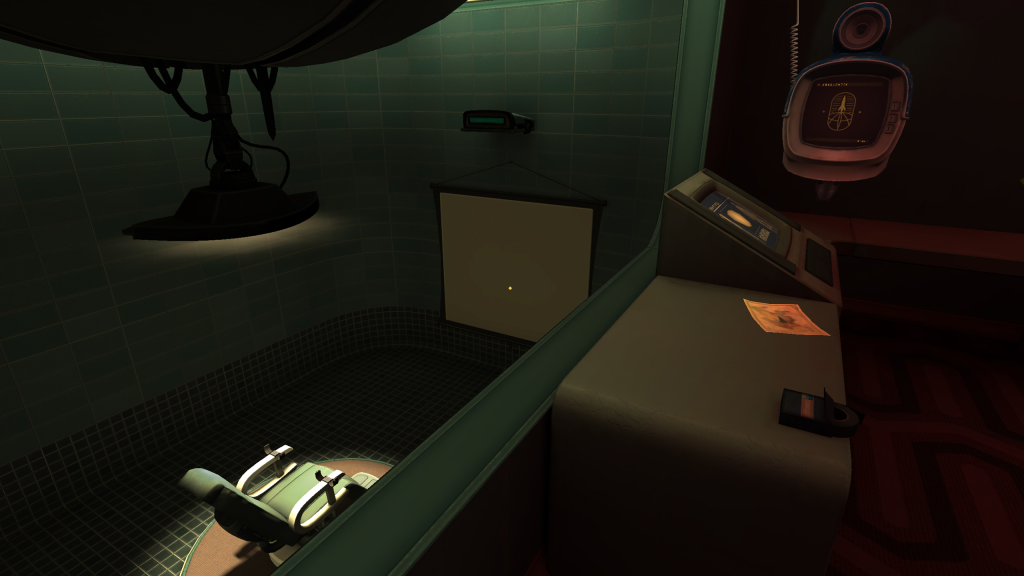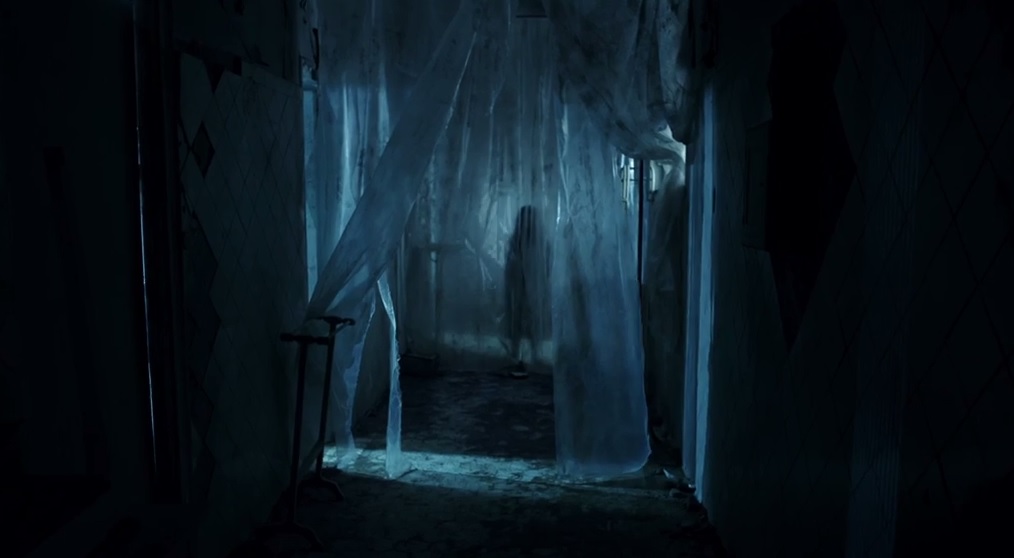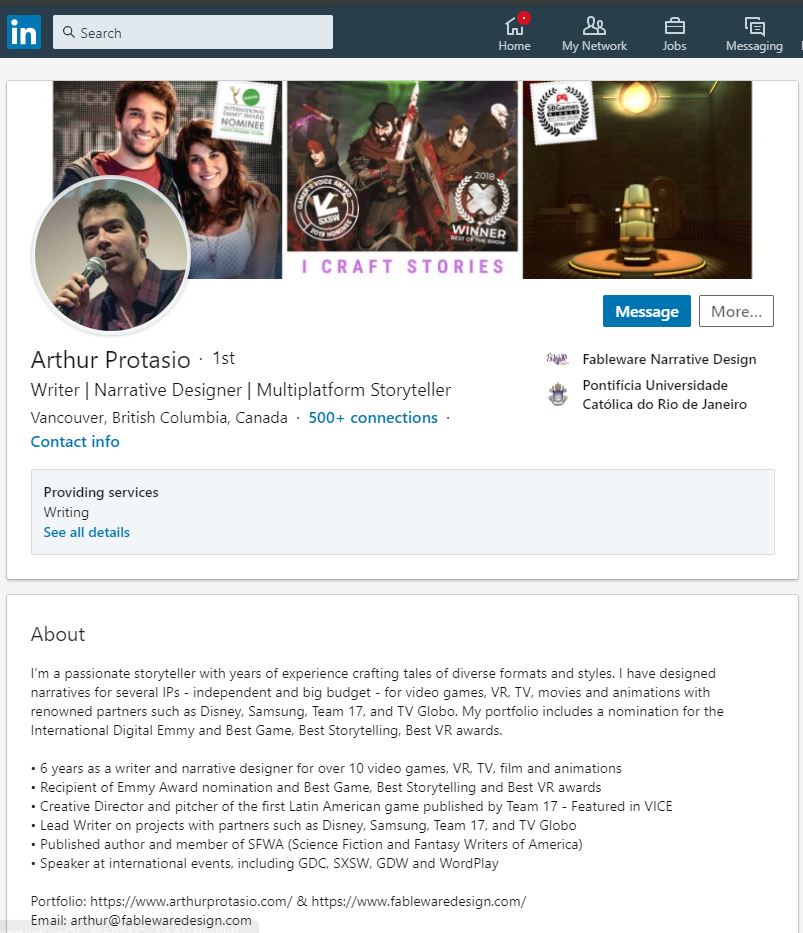Arthur Protasio is a passionate narrative designer with years of experience crafting tales of diverse formats and styles. He design narratives and creating content/ stories for multiple platforms.
His work has also nominated for the International Digital Emmy and Best Game, Best Storytelling, Best VR awards.



Arthur graduated from a law school and started working in a research centre focusing on understanding the connections between law, culture and arts. He investigated freedom of speech and also how games were seen as a culture, an artistic artefact and be able to communicate messages. Eventually, he did a migration from an academic researcher to a freelance writer and started a YouTube channel in 2011, focus on discussing narrative in games. In 2015, he has founded his own company Fableware Narrative Design on providing creative writing, narrative design and transmedia storytelling services.

Skype Interview with Arthur Protasio in Narrative Designer:
How did you get your job as a game writer?
It is an interesting story because my background does not come from the necessary writing. I am originally a BA of Laws. After I graduated, I started working with the Research Centre that was focused on understanding the connections between law, culture and arts. By doing that connection, I started investigating more about freedom of speech and how games were seen as a culture and an artistic artefact. Games and emotions were able to communicate, history, culture or even politic. From that perspective, I started not only getting more involved in games for my research and also understanding games through a content production perspective. I have already been involved in writing, but I am very personal. So, what I did eventually did this migration from an academic researcher who had already experienced writing short stories, poems etc. I actually started applying that as a freelance writer in video games and started working on my own projects. I started a YouTube channel in 2011 focus on discussing narrative in games.
On the other hand, I had a more hands-on approach in terms of creating content, going to game jams, writing stories and finding ways to make them actually become games. It was a big mix of my experience from a law perspective. Also, the experience that acquired as a writer throughout time, which eventually let me to starting my own company, and even taking my master in design with the focus on interactive storytelling.
How would you describe what you do every day as a Narrative Designer?
It depends on the project, but I can thankfully say that it involves a lot of writing. On a daily basis, my activity is ranged from let say writing, it could be pitching a concept to a client or even to a publisher. Depending on the stage of the project, either I’m pitching that project and having meetings. Some of them online, some of them offline and in person. But I usually have meetings with the partners. Once we have gone past the stage of agreeing and deciding on the concept that we’re going to develop, then that’s where I usually really focus on writing the content itself. That is where it just me or it could be a team. Still, it’s this very focus process of sitting down and writing the story and writing the story can happen in so many levels because it could be a script which can be breaking down the scenes, describing the scenes and then going down to into dialogues. But usually, that’s like the final stage when I’m done with the script, people review that, and I make adjustments etc.
Before we get to that, there’s a lot of development when it comes to the process of the concept development project. Also, I have to work with lots of spreadsheets and distributing information to the different columns and lines rather than a typical script that we would see for a movie. There’s also the part of just where putting together, one-sheet document, explain the concept of the story.
Sometimes the clients approach me with already concept in mind. I help them flash it out and find the potential flaws or find ways to make it better. But sometimes it very open-ended as in we want you to pitch something, the story, and if we like it, we will move ahead with it. So, it can change a lot. It can be a very multi-faceted work process, even on a daily basis.
What is your favourite part of the job?
I love writing, creating content, and seeing writing as it’s one of the many ways it’s actually communicating a specific message, your concept or create a vision.
My favourite part of the job is creating as in understanding how can we process emotions, human emotions and apply them on characters, the stories, the plots. Also, understand the connection between them with the platform that we’re using.
If I’m writing a comic book, I always need to be mindful of how I choose to distribute the story, and where I’m placing specific element of the story to make sure I have something really interesting right in the end. People are very curious like what’s going to happen, and you turn the page, and then have two other pages of development. So that’s the case of a comic book.
If I’m working with the game, what mechanics do we have in the game? Is it a strategy game? We released an attack core RPG called Sword Legacy in 2018. And it is the story about Uther, a dragon King Arthur’s father. King Arthur is not even in the game, it’s just the game original story about Uther and Merlin. What’s interesting is that it’s this emotional journey that Uther goes through to try to meet again Princess Igraine who some people know in the myth in the legend, is actually King Arthur’s Mother. But the story isn’t very emotional on one side, because it is Uther trying to see her again, trying to help her and the other hand it is also this very strategical logical experience because it is a strategy game. So, we create this polarizing relationship between obsession and strategy. And if you are very strategic the game, you would able to advance throughout the levels. And if you give in to obsession, if you have given in to emotion, that means you can use will power which is a feature in the game to boost your stats, so that’s a metaphor of the characters emotions and the experience.
But on the other hand, if you gave too much into obsession, that means your character could be panic, you can lose control of the character. So bad things can happen when you give in the obsession, and that is actually the message of the whole game. Like how do you deal with the desperate desires of the heart, for example of what we want, how can desire corrupt us. That is one of the questions of the game. And we choose to manifest that through the mechanics, the features, through the experience.
So, in this case, understanding the way and which the player interacts with the experience is absolutely crustal and I think that’s without a doubt. That’s why I enjoy creating content for so many platforms. It is always a challenge to understand what you want to communicate and how you’re going to communicate that. Because the same story as in the same character, in the same world, and the same plot, they can be adapted to different platforms. It could be a comic book, a movie, a game, and could be a novel. And all of them would tell the same story, the same content in different ways.
